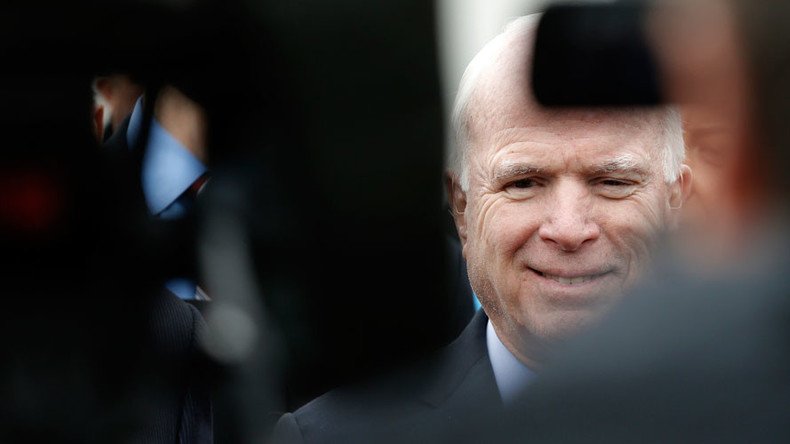John McCain NGO banned as ‘undesirable group’ in Russia

Russian prosecutors have recognized the International Republican Institute NGO headed by US Senator John McCain as an undesirable organization, banning the group’s operations in the country and forbidding Russian organizations and citizens from cooperating with it.
“After studying the received files [describing the activities of the International Republican Institute], the Prosecutor General’s Office has made the decision to recognize it as an undesirable group on the territory of the Russian Federation,” reads an official statement from prosecutors, released on Thursday.
Another US organization, the Media Development Investment Fund, was also recognized as undesirable.
Prosecutors added that they had established that the work of the two groups posed a threat to the foundations of Russia’s constitutional order and state security, but gave no further details.
The International Republican Institute was founded in 1983 with the declared goal of the promotion of democracy worldwide through helping political parties in foreign countries.
Since 1993 the institute has been headed by John McCain – a Republican senator for Arizona known for his numerous anti-Russian initiatives and statements.
In early 2015 Russia reportedly included McCain in the list of people subject to personal sanctions, including an entry ban and assets freeze, introduced in response to a similar measures imposed by the United States against Russian officials in 2014.
READ MORE: Russia slaps personal sanctions on 200+ foreign citizens – report
The Russian Law on Undesirable Foreign Organizations came into force in late May 2015. The act requires the Prosecutor General’s Office and the Foreign Ministry to make an official list of undesirable foreign groups and outlaw their activities. Once a group is recognized as undesirable, all its assets in Russia must be frozen, its offices closed and the distribution of its information materials banned. If the ban is violated, both the personnel of the outlawed group and any Russian citizens who cooperate with it face heavy fines or even prison terms in the event of repeated or aggravated offenses.
About a month after the law came into force, Russia’s upper house released a list of foreign organizations it believed should come under the new restrictions. The list consisted of 12 entries, including such groups as the National Democratic Institute, the US National Endowment for Democracy and the Open Society Institute also known as the Soros Foundation.
READ MORE: Upper house approves first list of 12 ‘undesirable’ foreign groups
Several of these groups have already been put on the list of undesirables, including the US National Endowment for Democracy, George Soros’s Open Society Institute and the Open Society Institute Assistance Foundation, the US-Russia Foundation for Economic Advancement and the Rule of Law (USRF), and the US National Democratic Institute – chaired by former US Secretary of State Madeleine Albright.












